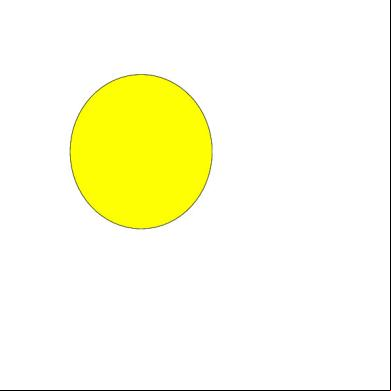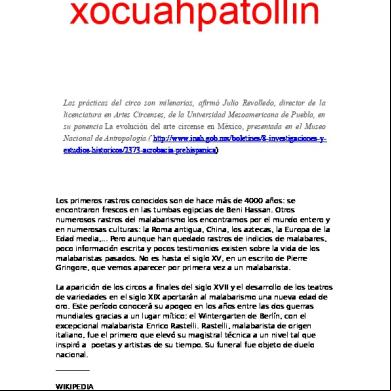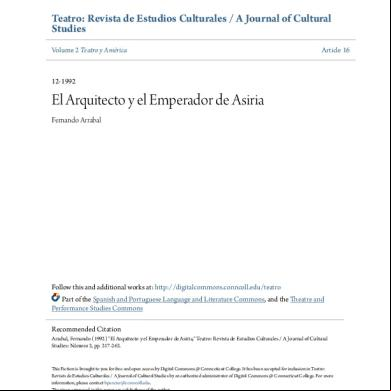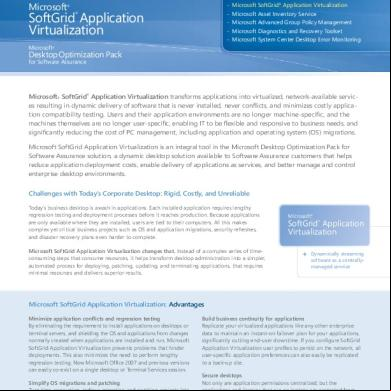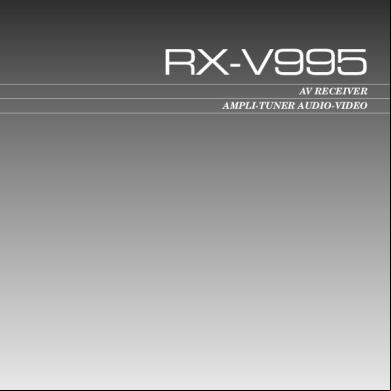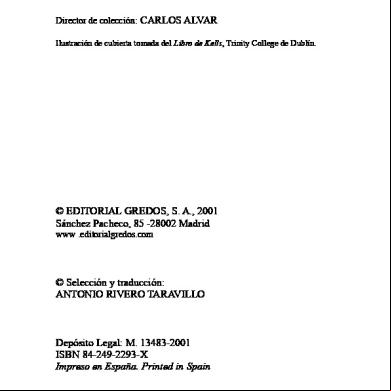Direct And Indirect Speech.pdf 36a5o
This document was ed by and they confirmed that they have the permission to share it. If you are author or own the copyright of this book, please report to us by using this report form. Report 3i3n4
Overview 26281t
& View Direct And Indirect Speech.pdf as PDF for free.
More details 6y5l6z
- Words: 1,245
- Pages: 4
DIRECT SPEECH
REPORTED SPEECH
PRESENT SIMPLE
PAST SIMPLE
She said, "I am happy". (Ella dijo, "Estoy feliz") He said: "I work everyday". (El dijo, "Trabajo a diario")
She said that she was happy . (Ella dijo que estaba feliz) He said that he worked everyday. (El dijo que trabajaba a diario)
PRESENT PROGRESSIVE
PAST PROGRESSIVE
You said, "They are reading". (Usted dijo, "Ellos/as están leyendo")
You said that they were reading. (Usted dijo que ellos/as estaban leyendo)
PRESENT PERFECT SIMPLE
PAST PERFECT SIMPLE
He said, "I have bought a car". (El dijo, "He comprado un auto")
He said that he had bought a car. (El dijo que había comprado un auto)
PAST SIMPLE
PAST PERFECT SIMPLE
He said, "I bought a piano". (El dijo, "Compré un piano")
He said that he had bought a piano. (El dijo que había comprado un piano)
PAST PROGRESSIVE
PAST PERFECT PROGRESSIVE
He said, "I was working ". (El dijo, "Estuve/Estaba trabajando")
He said that he had been working . (El dijo que había estado trabajando)
FUTURE OF INTENTION (going to)
PAST OF INTENTION (going to)
She said, "I am going to win". (Ella dijo, "Voy a ganar")
She said that she was going to win. (Ella dijo que iba a ganar)
FUTURE SIMPLE
CONDITIONAL SIMPLE
They said, "We will lose ". (Ellos dijeron, "Perderemos")
They said that they would lose . (Ellos dijeron que perderían)
FUTURE PERFECT
PERFECT CONDITIONAL
He said, "I will have bought the house by June 2010".
He said that he would have bought the house by June 2010.
(El dijo, "Habré comprado la casa para junio 2010")
(El dijo que habría comprado la casa para junio 2010)
FUTURE PROGRESSIVE
PROGRESSIVE CONDITIONAL
She said, "I will be having tea with Helen at 5 pm". (Ella dijo, "Estaré tomando el té con Helen a las 5 de la tarde")
She said that she would be having tea with Helen at 5 pm. (Ella dijo que estaría tomando el té con Helen a las 5 de la tarde)
PRESENT PERFECT PROGRESSIVE
PAST PERFECT PROGRESSIVE
She said, "I have been painting the walls". (Ella dijo, "He estado pintando las paredes")
She said that she had been painting the walls. (Ella dijo que había estado pintando las paredes)
2. AQUÍ ESTOY CON MAS CARACTERISTICAS DE LA VOZ DIRECTA E INDIRECTA Algo para que tengas MUY en cuenta: De los tiempos verbales que has aprendido hasta ahora, ni elCondicional Simple ni el Pasado de Intención (going to) pueden hacerse MAS PASADOS, por lo tanto estos tiempos NO CAMBIAN al pasarse a la Voz Indirecta. Observa estos ejemplos:
DIRECT SPEECH
REPORTED SPEECH
CONDITIONAL SIMPLE
CONDITIONAL SIMPLE
They said, "We would like to visit Buenos Aires and Montevideo". (Ellos/as dijeron, "Nos gustaría visitar Buenos Aires y Montevideo")
They said that they would like to visit Buenos Aires and Montevideo. (Ellos/as dijeron que les gustaría visitar Buenos Aires y Montevideo)
PAST OF INTENTION (going to)
PAST OF INTENTION (going to)
She said, "Gordon was going to win the elections". (Ella dijo, "Gordon estuvo por ganar las elecciones")
She said that Gordon was going to win the elections. (Ella dijo que Gordon estuvo por ganar las elecciones)
VEAMOS AHORA QUE OCURRE CON LOS OTROS VERBOS AUXILIARES ... a) Algunos verbos auxiliares tienen pasado y, en estos casos, funcionan con las mismas
pautas que aparecen en la TABLA DE CONVERSION de la página anterior. Recuerda que CAN (poder) puede ser reemplazado por su equivalente ABLE TO (capaz de) y MUST (deber) por su equivalente HAVE TO (tener que). Observa estos ejemplos: PRESENT SIMPLE
PAST SIMPLE
She said: "I can swim". (Ella dijo, "Puedo nadar") She said: "I am able to swim". (Ella dijo, "Puedo nadar")
She said that she could swim. (Ella dijo que ella podía nadar) She said that she was able to swim. (Ella dijo que ella podía nadar)
He said: "I must study". (El dijo, "Debo estudiar") He said: "I have to study". (El dijo, "Debo/Tengo que estudiar")
He said that he had to study. (El dijo que debía/tenía que estudiar) He said that he had to study. (El dijo que debía/tenía que estudiar)
b) Los verbos auxiliares COULD, WOULD, SHOULD, MIGHT, OUGHT TO, USED TO yMUSTN'T no tienen forma en pasado, por lo tanto NO CAMBIAN al pasarlos a la Voz Indirecta. Aquí tienes algunos ejemplos: PAST SIMPLE
PAST SIMPLE
He said, "I could fly easily". (El dijo, "Pude volar con facilidad") She said, "I used to eat snails". (Ella dijo, "Solía comer caracoles")
He said that he could fly easily. (El dijo que pudo volar con facilidad) She said that she used to eat snails. (Ella dijo que solía comer caracoles)
OBSERVA AHORA COMO PUEDES CONVERTIR LOS PEDIDOS ... Para transformar PEDIDOS (o REQUESTS, en inglés) a la Voz Indirecta se utilizan habitualmente los verbos ASK (pedir) o TELL (decir, indicar) mediante dos fórmulas de simple aplicación. Presta atención: a) Si el pedido o request es afirmativo, la Voz Indirecta se hace convirtiendo el pedido a INFINITIVO AFIRMATIVO CON TO (to go, to bring, to come, etc.) b) Si el pedido o request es negativo, la Voz Indirecta se hace convirtiendo el pedido a INFINITIVO NEGATIVO CON TO (not to go, not to bring, not to come, etc.) AFFIRMATIVE-NEGATIVE REQUESTS
AFFIRMATIVE-NEGATIVE INFINITIVES
She asked me, " Bring some soda". (Ella me pidió, "Trae algunas gaseosas") She told me, " Don't say anything". (Ella me indicó, "No digas nada")
She asked me to bring some soda. (Ella me pidió llevar algunas gaseosas) She told me not to say anything. (Ella me indicó no decir nada)
3. AQUÍ ESTOY CON EL FINAL DE LA VOZ DIRECTA E INDIRECTA Ahora analizaremos cómo se convierten los dos tipos de PREGUNTAS (QUESTIONS, en
inglés) a la Voz Indirecta: 1. Si la pregunta es DIRECTA, es decir, comienza con un verbo o un auxiliar (are, was, do, does, did, etc.), la fórmula para reportar es ASKED + IF... (preguntó si...). 2. Si la pregunta es INDIRECTA, es decir, comienza con un pronombre interrogativo (what, who, etc.), la fórmula para reportar es ASKED + PRONOMBRE INTERROGATIVO... (preguntó qué..., quién..., etc.). Observa estos ejemplos:
DIRECT SPEECH
REPORTED SPEECH
DIRECT QUESTIONS (are, do, does, etc.)
ASKED IF ...
He asked me, " Do you smoke?" (El me preguntó, "¿Fumas tú?") He asked me, " Are you Argentine?" (El me preguntó, "¿Eres argentino?")
He asked me if I smoked . (El me preguntó si yo fumaba) He asked me if I was Argentine. (El me preguntó si yo era argentino)
INDIRECT QUESTIONS (what, who, etc.)
ASKED WHAT ...
He asked me, " When do you smoke?" (El me preguntó, "¿Cuándo fumas tú?") He asked me, " Where are you from?" (El me preguntó, "¿De dónde vienes?")
He asked me when I smoked . (El me preguntó cuando fumaba) He asked me where I was from. (El me preguntó de dónde venía)
Y para finalizar (What a relief!!, ¡¡Qué alivio!!), aquí va la última tabla que también deberás memorizar. Contiene ciertas palabras que también sufren cambios al convertir un texto de Voz Directa a Voz Indirecta. Estos son los cambios:
DIRECT
REPORTED
DIRECT
REPORTED
this
that or the
next year
the following year
these
those or the
yesterday
the day before
here
there
tomorrow
the next day or the following day
now
then
ago
before
the day before yesterday
two days before
today
that day
the day after tomorrow
in two days time or two days later
last year
the previous year
REPORTED SPEECH
PRESENT SIMPLE
PAST SIMPLE
She said, "I am happy". (Ella dijo, "Estoy feliz") He said: "I work everyday". (El dijo, "Trabajo a diario")
She said that she was happy . (Ella dijo que estaba feliz) He said that he worked everyday. (El dijo que trabajaba a diario)
PRESENT PROGRESSIVE
PAST PROGRESSIVE
You said, "They are reading". (Usted dijo, "Ellos/as están leyendo")
You said that they were reading. (Usted dijo que ellos/as estaban leyendo)
PRESENT PERFECT SIMPLE
PAST PERFECT SIMPLE
He said, "I have bought a car". (El dijo, "He comprado un auto")
He said that he had bought a car. (El dijo que había comprado un auto)
PAST SIMPLE
PAST PERFECT SIMPLE
He said, "I bought a piano". (El dijo, "Compré un piano")
He said that he had bought a piano. (El dijo que había comprado un piano)
PAST PROGRESSIVE
PAST PERFECT PROGRESSIVE
He said, "I was working ". (El dijo, "Estuve/Estaba trabajando")
He said that he had been working . (El dijo que había estado trabajando)
FUTURE OF INTENTION (going to)
PAST OF INTENTION (going to)
She said, "I am going to win". (Ella dijo, "Voy a ganar")
She said that she was going to win. (Ella dijo que iba a ganar)
FUTURE SIMPLE
CONDITIONAL SIMPLE
They said, "We will lose ". (Ellos dijeron, "Perderemos")
They said that they would lose . (Ellos dijeron que perderían)
FUTURE PERFECT
PERFECT CONDITIONAL
He said, "I will have bought the house by June 2010".
He said that he would have bought the house by June 2010.
(El dijo, "Habré comprado la casa para junio 2010")
(El dijo que habría comprado la casa para junio 2010)
FUTURE PROGRESSIVE
PROGRESSIVE CONDITIONAL
She said, "I will be having tea with Helen at 5 pm". (Ella dijo, "Estaré tomando el té con Helen a las 5 de la tarde")
She said that she would be having tea with Helen at 5 pm. (Ella dijo que estaría tomando el té con Helen a las 5 de la tarde)
PRESENT PERFECT PROGRESSIVE
PAST PERFECT PROGRESSIVE
She said, "I have been painting the walls". (Ella dijo, "He estado pintando las paredes")
She said that she had been painting the walls. (Ella dijo que había estado pintando las paredes)
2. AQUÍ ESTOY CON MAS CARACTERISTICAS DE LA VOZ DIRECTA E INDIRECTA Algo para que tengas MUY en cuenta: De los tiempos verbales que has aprendido hasta ahora, ni elCondicional Simple ni el Pasado de Intención (going to) pueden hacerse MAS PASADOS, por lo tanto estos tiempos NO CAMBIAN al pasarse a la Voz Indirecta. Observa estos ejemplos:
DIRECT SPEECH
REPORTED SPEECH
CONDITIONAL SIMPLE
CONDITIONAL SIMPLE
They said, "We would like to visit Buenos Aires and Montevideo". (Ellos/as dijeron, "Nos gustaría visitar Buenos Aires y Montevideo")
They said that they would like to visit Buenos Aires and Montevideo. (Ellos/as dijeron que les gustaría visitar Buenos Aires y Montevideo)
PAST OF INTENTION (going to)
PAST OF INTENTION (going to)
She said, "Gordon was going to win the elections". (Ella dijo, "Gordon estuvo por ganar las elecciones")
She said that Gordon was going to win the elections. (Ella dijo que Gordon estuvo por ganar las elecciones)
VEAMOS AHORA QUE OCURRE CON LOS OTROS VERBOS AUXILIARES ... a) Algunos verbos auxiliares tienen pasado y, en estos casos, funcionan con las mismas
pautas que aparecen en la TABLA DE CONVERSION de la página anterior. Recuerda que CAN (poder) puede ser reemplazado por su equivalente ABLE TO (capaz de) y MUST (deber) por su equivalente HAVE TO (tener que). Observa estos ejemplos: PRESENT SIMPLE
PAST SIMPLE
She said: "I can swim". (Ella dijo, "Puedo nadar") She said: "I am able to swim". (Ella dijo, "Puedo nadar")
She said that she could swim. (Ella dijo que ella podía nadar) She said that she was able to swim. (Ella dijo que ella podía nadar)
He said: "I must study". (El dijo, "Debo estudiar") He said: "I have to study". (El dijo, "Debo/Tengo que estudiar")
He said that he had to study. (El dijo que debía/tenía que estudiar) He said that he had to study. (El dijo que debía/tenía que estudiar)
b) Los verbos auxiliares COULD, WOULD, SHOULD, MIGHT, OUGHT TO, USED TO yMUSTN'T no tienen forma en pasado, por lo tanto NO CAMBIAN al pasarlos a la Voz Indirecta. Aquí tienes algunos ejemplos: PAST SIMPLE
PAST SIMPLE
He said, "I could fly easily". (El dijo, "Pude volar con facilidad") She said, "I used to eat snails". (Ella dijo, "Solía comer caracoles")
He said that he could fly easily. (El dijo que pudo volar con facilidad) She said that she used to eat snails. (Ella dijo que solía comer caracoles)
OBSERVA AHORA COMO PUEDES CONVERTIR LOS PEDIDOS ... Para transformar PEDIDOS (o REQUESTS, en inglés) a la Voz Indirecta se utilizan habitualmente los verbos ASK (pedir) o TELL (decir, indicar) mediante dos fórmulas de simple aplicación. Presta atención: a) Si el pedido o request es afirmativo, la Voz Indirecta se hace convirtiendo el pedido a INFINITIVO AFIRMATIVO CON TO (to go, to bring, to come, etc.) b) Si el pedido o request es negativo, la Voz Indirecta se hace convirtiendo el pedido a INFINITIVO NEGATIVO CON TO (not to go, not to bring, not to come, etc.) AFFIRMATIVE-NEGATIVE REQUESTS
AFFIRMATIVE-NEGATIVE INFINITIVES
She asked me, " Bring some soda". (Ella me pidió, "Trae algunas gaseosas") She told me, " Don't say anything". (Ella me indicó, "No digas nada")
She asked me to bring some soda. (Ella me pidió llevar algunas gaseosas) She told me not to say anything. (Ella me indicó no decir nada)
3. AQUÍ ESTOY CON EL FINAL DE LA VOZ DIRECTA E INDIRECTA Ahora analizaremos cómo se convierten los dos tipos de PREGUNTAS (QUESTIONS, en
inglés) a la Voz Indirecta: 1. Si la pregunta es DIRECTA, es decir, comienza con un verbo o un auxiliar (are, was, do, does, did, etc.), la fórmula para reportar es ASKED + IF... (preguntó si...). 2. Si la pregunta es INDIRECTA, es decir, comienza con un pronombre interrogativo (what, who, etc.), la fórmula para reportar es ASKED + PRONOMBRE INTERROGATIVO... (preguntó qué..., quién..., etc.). Observa estos ejemplos:
DIRECT SPEECH
REPORTED SPEECH
DIRECT QUESTIONS (are, do, does, etc.)
ASKED IF ...
He asked me, " Do you smoke?" (El me preguntó, "¿Fumas tú?") He asked me, " Are you Argentine?" (El me preguntó, "¿Eres argentino?")
He asked me if I smoked . (El me preguntó si yo fumaba) He asked me if I was Argentine. (El me preguntó si yo era argentino)
INDIRECT QUESTIONS (what, who, etc.)
ASKED WHAT ...
He asked me, " When do you smoke?" (El me preguntó, "¿Cuándo fumas tú?") He asked me, " Where are you from?" (El me preguntó, "¿De dónde vienes?")
He asked me when I smoked . (El me preguntó cuando fumaba) He asked me where I was from. (El me preguntó de dónde venía)
Y para finalizar (What a relief!!, ¡¡Qué alivio!!), aquí va la última tabla que también deberás memorizar. Contiene ciertas palabras que también sufren cambios al convertir un texto de Voz Directa a Voz Indirecta. Estos son los cambios:
DIRECT
REPORTED
DIRECT
REPORTED
this
that or the
next year
the following year
these
those or the
yesterday
the day before
here
there
tomorrow
the next day or the following day
now
then
ago
before
the day before yesterday
two days before
today
that day
the day after tomorrow
in two days time or two days later
last year
the previous year






